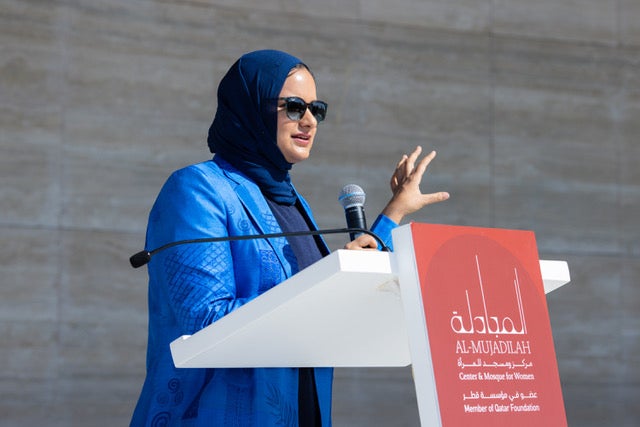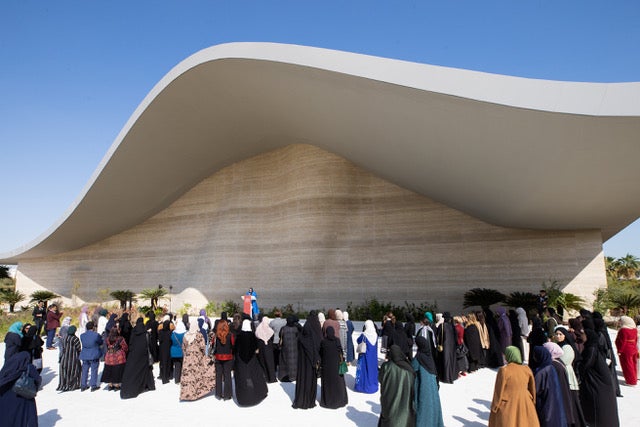Meet the Faculty Member Making Islamic Research More Accessible

In January 2024, the Al-Mujadilah Center and Mosque for Women opened its doors with an ambitious vision: to be a brave and dynamic place for Muslim women to learn, connect, and engage in public debate. Now, just six months later, thanks to the visionary leadership of Executive Director Dr. Sohaira Siddiqui, the center is already achieving its goals.
Founded by HH Sheikha Moza bint Nasser, Chairperson of Qatar Foundation, the center aims to strengthen Islamic identity among Muslim women of all ages and backgrounds and to enrich contemporary Islamic discourse.

Integral to executing the project is Dr. Siddiqui, an Associate Professor of Islamic Studies and Theology at Georgetown University in Qatar. Her vast knowledge of Islamic law and experience at the forefront of other centers of learning have been instrumental in bringing Sheikha Moza’s vision to life.
The center honors the rich history of Muslim women as leaders and thinkers, focusing on research projects in Islamic texts, law, and ethics; Muslim women’s lives; and Muslim women’s health and well-being. Even the name Al-Mujadilah, inspired by Surat Al-Mujadilah (She Who Discourses), reflects the influence of Khawla bint Tha’labah, a companion of the Prophet who successfully advocated for the protection of women under Islamic law. “When I was first approached about Al-Mujadilah, I saw it as an exceptional opportunity to create a unique space for learning and discussion,” says Dr. Siddiqui. The role allowed her to bridge her academic life and her deep understanding of the profound gap that remains in the study of Muslim women’s lives, past and present.
Dr. Siddiqui’s work at Al-Mujadilah is deeply connected to her academic pursuits. An accomplished scholar, Dr. Siddiqui has published several books on the history of Islamic law. Her forthcoming book, Contesting Colonial Power: Refashioning Islamic Law in British India, explores how British colonial rule couldn’t wholly erase Islamic law. Starting from 1757, the book traces how Islamic law adapted and persisted within the common-law framework when the British East India Company attempted to replace Mughal authority and reshape the legal system to suit their administrative needs.
Her other books and research articles on Islamic law, coloniality, and gender have been well-received and continue to inspire scholars worldwide in English and Arabic. Her edited volume, Locating the Shari’a: Legal Fluidity in Theory, History, and Practice, has recently been translated into Arabic, and her 2019 book, Law and Politics under the ʿAbbasids: An Intellectual Portrait of al-Juwaynī, is also in the process of being translated.
At Al-Mujadilah, Dr. Siddiqui’s extensive research experience shapes the center’s initiatives. The center’s research and programming theme for the coming year, Muslim Women in Public Life: Possibilities and Challenges, explores how Muslim women have engaged in and contributed to society and public life from the inception of Islam to the present day. The center will explore the various dimensions of women’s public involvement—as scholars, economic actors, patrons, or political agents—and how this has been shaped by cultural, religious, and political factors in diverse historical and contemporary contexts. It will also give the work of female scholars a vibrant home and facilitate international research networks where their work can be shared.
For Dr. Siddiqui, leading the center is both a professional achievement and a personal mission. As a scholar and new mother, she sees the center’s potential to make a difference. “I have been Chair of the Board of Trustees of Cambridge Muslim College for several years, and I was pleased to be able to help shape another center for learning closer to home, one focused on advancing female scholarship and engagement with Islam.” Having already welcomed thousands of women through their doors in the first few months of operation, completed two cycles of over fifty programs, and hosted their first Ramadan, the center has ambitious plans beyond the already considerable achievements of their first year.
Looking ahead, Al-Mujadilah aims to expand its offerings by rolling out new partnerships and initiatives in the coming months. “We’re committed to creating opportunities for women’s intellectual growth, community building, and research,” Dr. Siddiqui affirms. More information on Al-Mujadilah, including a full list of programs and activities, can be found at www.almujadilah.qa.